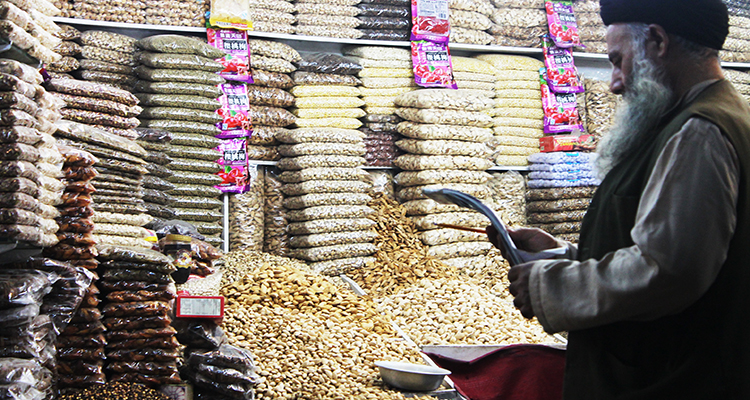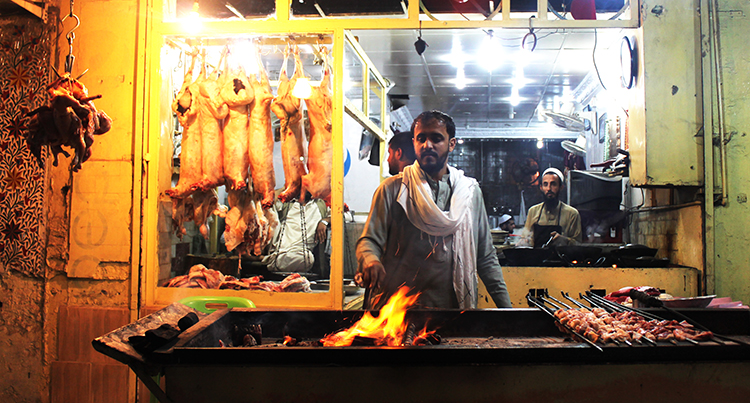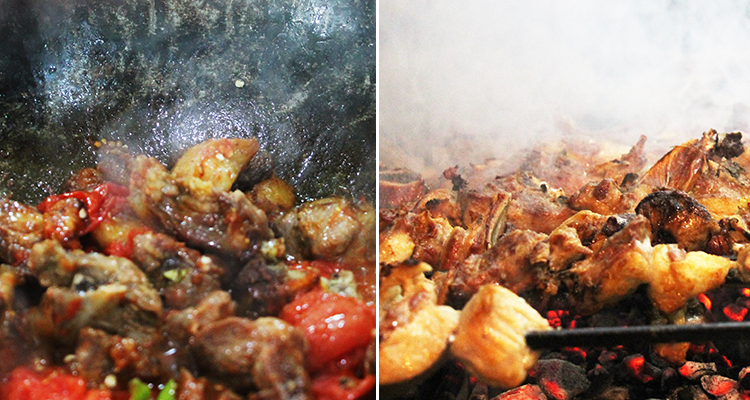Written by: Yusra Hussain
Posted on: November 27, 2015 | 
Dum Pukht and Mutton Karahi
Namak Mandi is now saturated with medicine markets, tandoors, and even banks and general stores, but the larger part of the Mandi is dominated by restaurants, whose cooks can easily pass as connoisseurs of food, particularly meat dishes.

At one end of the Namak Mandi are its dry fruit shops. The shopkeepers can be found sunk amidst mounds of dry fruits stacked and displayed neatly in an uphill sloping fashion. Packed or loose, these shops sell an assortment of dry fruits – almonds, raisins, walnuts, cashew nuts, peanuts, pine nuts, dried coconuts, pistachios, dried figs, roasted gram, dates, dried apricots – you name it. Many passersby are seen using the gesture of salam as they traverse these shops, occasionally stopping and popping a peanut in their mouth from one of the arranged stacks. It’s a place filled with the noises of a living city: the clattering of spoons against woks, the opening and closing of pot lids, honking cars, little kids shouting and running after each other with grocery bags in their hands, rickshaws starting their engines, and the occasional blaring sounds of a pushto song coming from a tikka shop.
Namak Mandi is bright and luminous, with bulbs dangling over every shop and multi-colored fairy lights creeping over the signage to attract clientele. Inside the open restaurants, you’ll see waiters with a cloth on their shoulders, dexterously holding the plates of salad, naan and meat delicacies, and memorizing long lists of customers’ orders. Not long ago, some of the restaurants had charpoys set outside, with tables between them. Customers would get cozy in the charpoys, rest their backs against a bolster, and enjoy their freshly served meal. With the passage of time, the charpoys and bolsters have been replaced with plastic and wooden chairs, but fortunately the authentic taste of the food remains intact.
Most restaurants have a vast menu that includes sajji, kabab, dum pukht and a variety of meat-heavy dishes, but the two main items that have earned Namak Mandi its repute are tikkay and karahi. Displayed on the outside are hanging, skinned whole lambs, goats, and chickens. These skinned animals are cut into smaller pieces on the spot, before being tossed into a wok or put on a skewer. There are workers who wait the tables and wash, cut, and peel the vegetables, but it is only the cook himself who mixes the meat with spices and maybe tosses in the secret ingredient while he’s at it.

The cook vigorously fans the tikka on skewers, hidden behind white clouds of aromatic smoke from the barbecue grill. When you finally eat it, your fingers damp with the tender meat juices, you can tell that the meat has been expertly marinated, so much so that it becomes impossible to restrain yourself from ordering another batch. The mere sight of the karahi is likely to make your mouth water. And as your order is presented in front of you with the perfect condiments – mint chutney and the conventional salad – you’ll know you’re in for a finger-licking treat.

From a meet-up between old friends or a quick bite in the lunch break, to a night out with family or relatives, this place has witnessed countless stories, echoing laughter, and passionate political discussions over a plate of karahi and tikkay. After spending some time pondering over what makes the Namak Mandi experience so exceptional, I reached one conclusion: the secret ingredient is not found inside the food; it lurks in the ambiance of this place, and thus can never be replicated.
Bon appétit!
You may also like: